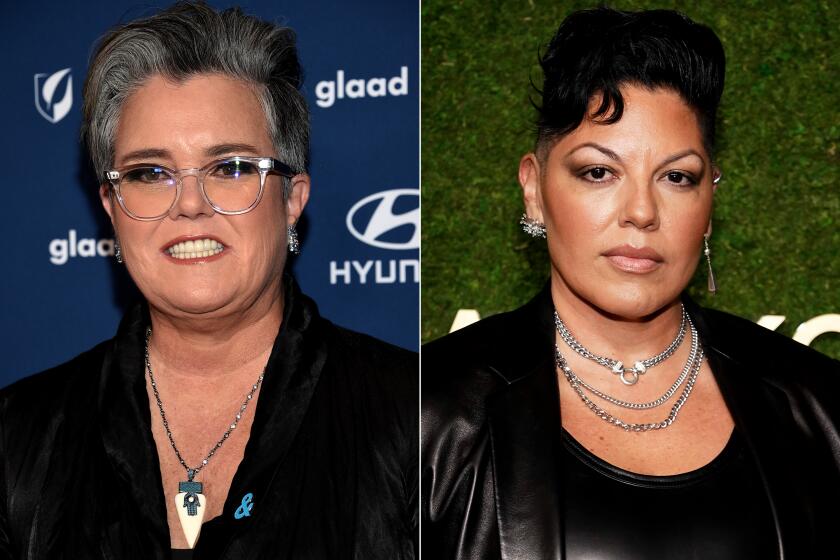An Appreciation: Jenni Rivera was a rare voice
Jenni Rivera was many things: a banda singer with a nimble voice, a chronicler with a unique perspective from Long Beach, an advocate of domestic violence awareness, a reality show star, a symbol.
The musician, who was believed to have died Sunday in Mexico, had her first child while in high school, endured a brutal case of domestic violence and then bravely addressed it in song and action, and rose in the ‘00s to be one of the most successful female banda singers in a male-dominated music style.
As her success grew, she matured into an artist with more universal aspirations and seemed to be on her way there.
Rivera’s gifts as a singer propelled her from her beginnings in the late 1990s to a level of acclaim that led many to know her quite simply as Jenni. That life was apparently cut short when the plane carrying her crashed on its way to Toluca, Mexico, after a concert in Monterrey. Authorities said there were no survivors. She was 43.
The daughter of Mexican immigrants, Rivera captured through her music stories about a life that straddled worlds and spoke to a fan base that bought an estimated 1.1 million albums in America and many more worldwide. Though she first gained fame through her banda music — the regional Mexican style that features as its main push overwhelming brass instrumentation and lyrically documents experiences from life — as her popularity grew she recorded in Mexican musical subgenres including the Latin pop, accordion-centric norteño and the renegade, drug-culture-infused narcocorridos.
Hers was a voice that immediately stood out in contemporary banda music for a simple reason: It wasn’t a man’s voice.
By busting into the boys’ club and delivering experiences, rebuttals and celebrations from a woman’s perspective, she drew the attention of a whole gender of listeners no doubt tired of their husbands’ favorite banda singers crooning out uncontested boasts.
PHOTOS: Jenni Rivera - Reactions to the tragic crash PHOTOS: Jenni Rivera missing
Rivera, in fact, didn’t even get the first lyric on her debut record. That honor went to her brother Lupillo, also a successful banda singer, as if to ease the music-loving public gently into the idea of a lady bringing her perspective into the poker room.
She continued offering music to a regional audience until 2003, when she released “Homenaje a Las Grandes,” on which she expanded her traditional sound with a more studio-centric and diverse approach.
Where early work was recorded undynamically, she started infusing her voice with echo, which seemed to fill her already sturdy tone with more depth. It also meant that when she nailed those bitter notes on “Juro Que Nunca Volvere” and spit out lyrical resolutions and denials about helpless love, they sounded good on the radio.
Over the following years, Rivera’s music grew more expansive. On her classic 2004 narcocorrido, “La Chacalosa,” the singer tells of being the daughter of a drug kingpin, running the operation while remaining untouchable, partying the nights away while learning to shoot and fight. At the other end, though, is the ballad — and one of her biggest hits — “Por Que No Le Calas.” Translated as “Why Don’t You Try It,” it pushes a lover to take a chance — with a tone that confirmed her ability to deliver a solid love song.
Gringos searching for evidence of her voice need look no further than her fantastic version of Freddy Fender’s “Wasted Days and Wasted Nights,” where she and a team of trumpets and a few percussionists, helped along by a boom-boom tuba and a drummer with a machine-gun snare, sang of affection gone south.
But that’s just a tiny piece of the puzzle, the bigger of which was obvious when tuning into the reaction on Sunday.
Both Telemundo and Los Angeles’ banda radio stations devoted nonstop hours to her music and legacy, one that will no doubt continue to grow with her passing.
PHOTOS AND MORE
PHOTOS: Iconic rock guitars and their owners
The Envelope: Awards Insider
PHOTOS: Grammy top nominees
More to Read
The biggest entertainment stories
Get our big stories about Hollywood, film, television, music, arts, culture and more right in your inbox as soon as they publish.
You may occasionally receive promotional content from the Los Angeles Times.






